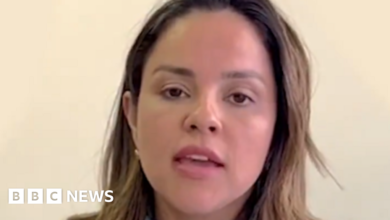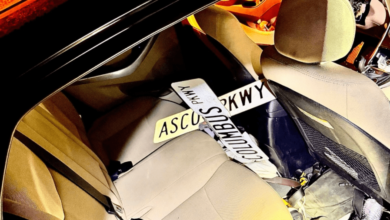Trump Says Ukraine Peace Talks Could Begin Soon After Taking Office

Ukraine on January 6 pressed its new assault in Kursk amid claims by Kyiv of major Russian losses there, while Moscow said its forces had taken a key town in eastern Ukraine as both sides bid for strategic positions ahead of any potential cease-fire talks.
The U.S.-based Institute for the Study of War said in a report late on January 5 that Ukrainian forces had resumed offensive operations in at least three directions within the Kursk region and achieved “tactical advances.”
The scale of the current offensive and whether it will lead to changes along the front line remains unclear, but U.S. Secretary of State Antony Blinken noted Ukraine’s positioning in Kursk is critical to possible future peace talks between Moscow and Kyiv.
“Their position in Kursk is an important one because certainly it’s something that would factor in any negotiation that may come about in the coming year,” Blinken told reporters during a trip to Seoul on January 6.
Ukrainian military agencies and Russian bloggers both reported intense fighting in Kursk, where Ukrainian troops first pushed into in a surprise incursion on August 6. They have since resisted Russian attempts to fully expel them.
Russian military analyst Yan Matveyev told RFE/RL’s Ukrainian Service on January 6 that the fresh push of the Kursk operation is more likely to be aimed at short-term goals rather than the longer term.
“It’s difficult to assume that Ukrainian forces have enough reserves to occupy vast territories in the Kursk region, including Kursk itself,” he said.
“They might try and expand their foothold ahead of negotiations. Besides, an attack like that makes the defensive side, Russia in this case, accumulate additional forces, thus weakening possible attacks in other parts of the front,” he added.
The head of Ukraine’s presidential office, Andriy Yermak, said there “was good news from the Kursk region” and that Russia was “getting what it deserves.”
According to Russian pro-war accounts on Telegram that closely follow and document frontline developments, the attack is being carried out with armored vehicles, mine-clearing vehicles, and electronic warfare systems, which are said to be successfully countering Russian drones.
Videos online purported to show columns of Ukrainian military vehicles speeding across snow-covered land in the Kursk region.
The MIG Rossyy channel claimed the Ukrainian military has had “local successes,” saying, “These are not sluggish maneuvers of small sabotage groups, but a full-scale attempt to attack.”
RFE/RL has not been able to independently verify the reports.
Russian forces, supported by the introduction of thousands of North Korean soldiers, have advanced but failed to eject Ukrainian troops entirely.
The offensive has reportedly been launched from the district center of Sudzha, which has been under Ukrainian control since August, in the direction of Bolshoye Soldatskoye, which lies some 70 kilometers from Kursk city, the region’s administrative center.
The Russian Defense Ministry said in a statement it had repelled a Ukrainian assault near the village of Berdin, some 15 kilometers from the border.
About half of the land seized in the initial offensive has been recaptured since August, but Kyiv still holds Sudzha and about 500 square kilometers of Russian territory.
In November, Ukraine reported its forces had engaged in combat with North Korean soldiers in the Kursk region and Ukrainian officials have claimed that North Korean forces are suffering heavy losses.
The introduction of North Korean troops followed Ukraine’s cross-border offensive, which Russian President Vladimir Putin condemned as a “major provocation.”
Ukraine’s General Staff said in a statement on January 6 that Russian forces have lost 1,550 soldiers over the past 24 hours. It did not elaborate.
Ukrainian President Volodymyr Zelenskiy said Russia has lost 38,000 in five months of fighting in the Kursk region, describing nearly 15,000 of the losses as “irrecoverable.”
Zelenskiy said in his nightly video address that Russia had deployed its strongest units to Kursk, including soldiers from North Korea, and Ukraine’s operation in the region had prevented them from being deployed to the front line in the Donetsk, Sumy, Kharkiv, and Zaporizhzhya regions.
Meanwhile, Russia’s Defense Ministry said its troops had taken the Ukrainian town of Kurakhove some 30 kilometers south of Pokrovsk – the strategic logistics hub that has been the target of Russian forces over the past several months.
If Russian forces were to take Pokrovsk, it would represent a major gain for the Kremlin after fighting that has left the city mostly in ruins, with most of its 64,000 prewar population having fled.
The developments come ahead of the inauguration of U.S. President-elect Donald Trump on January 20, who has previously said that ending the war in Ukraine would be a priority for his first day in office.
Keith Kellogg, the Trump administration’s incoming envoy for Ukraine and Russia, has been tasked with leading negotiations to end the war and also said that potential cease-fire talks could begin once Trump takes office.
In a December interview with Fox News, Kellogg said the war could “be resolved in the next few months.”
Amid speculation that he could visit Ukraine in the coming days, Reuters reported on January 6 that Kellogg had postponed the trip until after Trump’s January 20 inauguration.
Citing four sources familiar with the matter, Reuters reported that Kellogg is also seeking to set up meetings in other European capitals, including Rome and Paris.
In his comments, Blinken didn’t comment on the actual operations by the Ukrainian troops in Kursk, but he did say that if and when talks finally start, Kyiv would still need “adequate security assurances” against Putin.
“There is going to be, at some point, a cease-fire. It’s not going to be in Putin’s mind ‘game over’,” Blinken said.
“His imperial ambitions remain, and what he will seek to do is to rest, refit, and eventually re-attack,” Blinken said, calling for an “adequate deterrent in place so that he doesn’t do that.”




